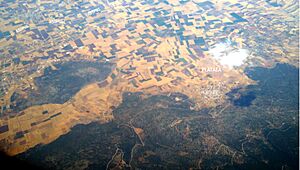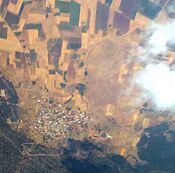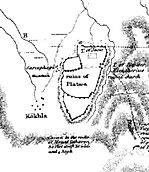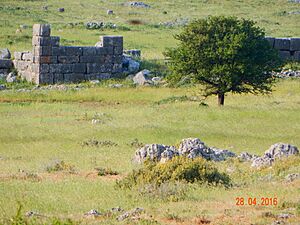Plataea facts for kids

Plataea was an ancient Greek city-state located in Boeotia, a region in Greece. It was near the border with Attica, at the base of Mount Cithaeron. The city was situated between the mountain and the Asopus River. This river separated Plataea's land from that of its powerful neighbor, Thebes. The people who lived there were called Plataeans.
Plataea is famous for being the site of the Battle of Plataea in 479 BC. In this important battle, a group of Greek city-states worked together to defeat the mighty Persians.
Over time, Plataea was destroyed and rebuilt many times. This happened during the Classical period of ancient Greece. Today, the modern Greek town of Plataies is right next to the ancient ruins.
Contents
Early History of Plataea
Plataea was first settled a very long time ago, during the Bronze Age. The ancient Greek poet Homer even mentioned it in his famous story, the Iliad. Local stories say that the people of Plataea were "born from the soil" itself. This means they believed they were the original inhabitants of the land. The city's name comes from Plataea, the daughter of an ancient king named Asopus. The nearby river is also named after him.
Around 520 BC, Plataea faced a big problem. The powerful city of Thebes wanted to control Plataea. Plataea didn't want to be ruled by Thebes and wasn't strong enough to fight them alone. So, Plataea asked Sparta for help. Sparta, however, told them:
We live too far away, and our help would be cold comfort to you. You could be enslaved many times over before any of us heard about it. We advise you to put yourselves under the protection of the Athenians, since they are your neighbours and not bad men at giving help.
The historian Herodotos said that Sparta had a secret reason for this advice. They wanted to cause trouble between Athens and Thebes. In the end, Plataea formed a strong friendship with Athens. The Plataeans remained loyal to Athens throughout their history.
Persian Wars: Great Battles
When the Persian king Dareios sent a huge army to invade Greece in 490 BC, Plataea helped. They sent 1,000 men to join Athens at the Battle of Marathon. They shared in the glory of this important victory. Ten years later, Plataean soldiers also served with the Athenian fleet. This was during the sea battle at Artemisium. Even though Plataea didn't have its own ships, they helped.
They missed the later Battle of Salamis. This was because they had to move their families and belongings out of the city. The Persian army was approaching. Soon after, the Persians arrived and burned Plataea to the ground.
The next year, 479 BC, Plataea's land became the site of the Battle of Plataea. This battle finally freed Greece from the Persian invaders. In this fight, a combined Greek army met the forces of the Persian general Mardonius. The battle took place on the plain next to the Asopus River.
Because this victory happened on Plataean land, its citizens received special honors. The Greek allies gave them a large sum of money, 80 talents. Plataea used this money to build a temple to the goddess Athena. They were also given the job of honoring the fallen warriors every year. These warriors had died in the battle. Every four years, Plataea also celebrated the Eleutheria festival. This festival remembered Greece's freedom from Persian rule. It was dedicated to Zeus Eleutherius, and a temple was built for him in Plataea. In return for these duties, the Greek cities promised to protect Plataea's independence.
Peloponnesian War: A City Under Siege
Plataea was rebuilt and lived in peace for a while. But this changed when the Peloponnesian War began. In the spring of 431 BC, before the war officially started, 300 Theban soldiers tried to take over Plataea. Some Plataeans who supported Thebes let them inside the city walls at night. However, the Plataeans quickly discovered the attack. They fought back and killed many Thebans, capturing 180 of them. Only a few escaped.
Plataea sent word to Athens about the attack. Then, the captured Thebans were executed. The Athenians were upset by this, but they sent soldiers to protect Plataea. This event became the spark that started the war between Athens and Sparta.
In the third year of the war (429 BC), the Peloponnesian army, led by the Spartan king Archidamus, attacked Plataea. They claimed Plataea had broken its promise to remain neutral after the Persian War. The Plataeans secured a temporary stop to the fighting. During this time, they sent their old men, women, and children to Athens. They also sent messengers to Athens to ask for advice. In the end, Plataea decided to stay allied with Athens. This led to the next attack.
The city's defense was small: only 400 Plataean citizens, 80 Athenians, and 110 women. Yet, this small group bravely resisted the entire Peloponnesian army. After many failed attempts to capture the city, the attackers gave up. They changed their siege into a blockade. They built two parallel walls around the city, 16 feet apart, with a ditch on each side. Then, they left a small force to guard the city and the main army went home.
In the second year of the blockade (428 BC), 212 of the trapped Plataeans managed to escape. They climbed over the walls at night and safely reached Athens. The next summer (427 BC), those remaining in Plataea ran out of food. They had to surrender to the Peloponnesians. After a "trial" by the Spartans, where Plataea's arguments were ignored, the remaining Plataeans were killed. The Thebans then destroyed all private buildings in Plataea. Later, they used the remains to build an inn and a small temple for the goddess Hera. The land was given to Plataeans who had supported Thebes.
Plataeans Move to Scione
In 423 BC, Athens and Sparta agreed to a one-year truce during the war. One rule was that no new lands could be conquered or revolts started after the truce was signed. The people of Scione had rebelled around this time. Sparta said it happened before the truce, but Athens believed it was after. The Athenian assembly then decided to "reduce and put to death the Scionaeans." The next year, Athens attacked Scione. They finally took the city and carried out their decision in 420 BC. After this, Athens gave the town of Scione to the Plataeans who were living in Athens. This became their new home.
When the Peloponnesian War ended, Athens had to leave Scione. The Plataeans once again found a welcoming home in Athens.
Peace and Return to Plataea
The Plataeans continued to live in Athens as exiles. This changed with the Peace of Antalcidas in 387 BC. This peace treaty, forced by the Persian king, said that all Greek cities should be independent. Sparta, wanting to weaken Thebes, used this chance to help the Plataeans return to their home city.
But the Plataeans did not keep their city for long. Thebes was always a threat to their independence. Sparta kept soldiers in Plataea to protect it, and also in the Boeotian cities of Thespiae and Orchomenus. In the 370s BC, Athens and Thebes went to war against Sparta. Sparta used Thespiae and Plataea as bases to attack Theban land. After several years, Thebes, sometimes with Athens' help, started to win these battles. In 375 BC, Sparta was busy with other wars and couldn't send help. Thebes took this chance to force these cities back into the Boeotian Federation. Plataea lost its independence again, even though it wasn't directly attacked.
Over the next few years, the Plataeans grew more and more unhappy with Thebes' control. Around 373-371 BC, they asked Athens for help. They wanted to bring back their old alliance. Of course, this made the Thebans very angry. Thebes attacked Plataea before Athens could respond.
This time, the Thebans did not kill the Plataeans. Instead, they forced them out of the city. The Plataeans went to Athens once more. After this, Thebes completely destroyed Plataea. They then did the same to the nearby city of Thespiae. As a result of these actions, Athens ended its alliance with Thebes and sought peace with Sparta.
In 371 BC, Sparta lost a major battle to Thebes at Leuktra. For the next two decades, Thebes was the most powerful city in Greece. This lasted until the rise of Macedon and Philip II's plan to control the whole region. During this time, the Plataeans remained in exile in Athens.
Battle of Chaeroneia and Freedom
In 338 BC, the ongoing war between Athens and Macedon reached its peak. Philip brought his army into southern Greece. At the last moment, Thebes, which had been allied with Macedon for years, switched sides. They fought with Athens against Philip and his son Alexander at the Chaeroneia. Macedon won a huge victory. As part of the peace agreements, Philip allowed the Plataeans to return to their city once more.
In 335 BC, Thebes rebelled against Alexander, who had become king the year before. In response, Alexander destroyed Thebes and sold its people into slavery. With their former rulers gone, the Plataeans were finally free.
Plataea's Later Years
After Philip rebuilt it, Plataea continued to be lived in for several centuries. A traveler named Pausanias visited it in the 2nd century AD. He mentioned three temples: one for Hera, one for Athena Areia, and one for Demeter Eleusinia. He described the temple of Hera as being inside the city. It was large and beautiful, filled with offerings. This was likely the temple built by the Thebans after Plataea's destruction.
The temple of Athena Areia was built with money from the spoils of the Battle of Marathon. It was decorated with paintings by famous artists like Polygnotus and Onatas. It also had a statue of the goddess made by the famous Athenian sculptor Pheidias. We don't have many details about the temple of Demeter Eleusinia. The temple of Zeus Eleutherius seemed to be just an altar and a statue by Pausanias' time. It was located outside the city.
Plataea is also mentioned in a 2nd-century AD Latin novel called Metamorphoses by Apuleius. In the story, Plataea is shown as a place where gladiators fought and wild animals were displayed.
Plataea's walls were repaired by the emperor Justinian in the 6th century AD.
The modern village of Plataies is next to the ancient ruins. You can still see the foundation stones of some of its old buildings.
Special Rights for Plataeans in Athens
There are many mentions of a special connection between Plataeans and Athenians. The exact details are debated by historians. The historian Thucydides wrote that the Thebans once said: "It was in defense against us, say you, that you became allies and citizens (politai) of Athens." Another historian, Diodorus Siculus, said that when Plataeans fled to Athens, they "received equality of civic rights (isopoliteia) as a mark of favour from the Athenian people."
The Greek playwright Aristophanes also mentioned this special status in his play Frogs. A note added to this play says that slaves who fought in a sea battle were given their freedom. They were then made "joint-citizens" with the Athenians, just like the Plataeans.
Perhaps the clearest explanation comes from the speaker Demosthenes in his speech Against Neaera. During this speech, a clerk read out an old law about the Plataeans from 429 BC. It said:
On motion of Hippocrates it is decreed that the Plataeans shall be Athenians from this day, and shall have full rights as citizens, and that they shall share in all the privileges in which the Athenians share, both civil and religious, save any priesthood or religious office which belongs to a particular family, and that they shall not be eligible to the office of the nine archons but their descendants shall be. And the Plataeans shall be distributed among the demes and the tribes; and after they have been so distributed, it shall no longer be lawful for any Plataean to become an Athenian, unless he wins the gift from the people of Athens.
If this law is accurate, it means that not all Plataeans forever became Athenian citizens. Instead, specific individuals and their children were given these special honors. It seems that these citizenship rights were given out multiple times over the years to different groups of Plataean exiles. This shows how important the alliance between Athens and Plataea was.
See also
 | Precious Adams |
 | Lauren Anderson |
 | Janet Collins |





